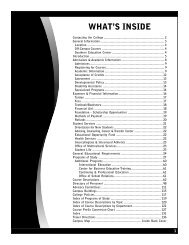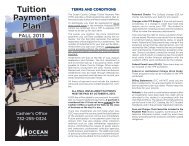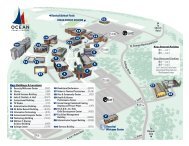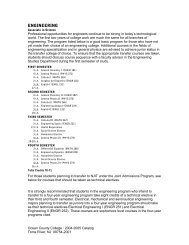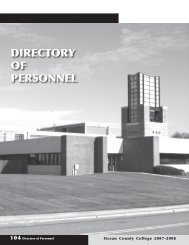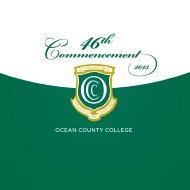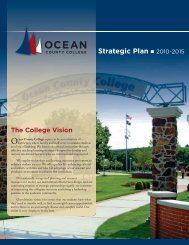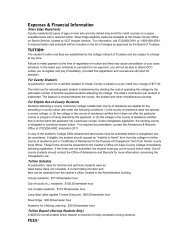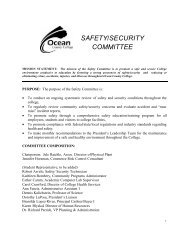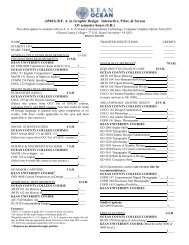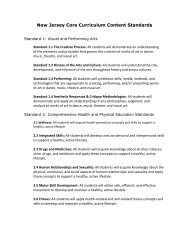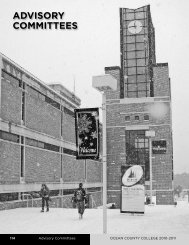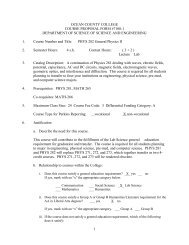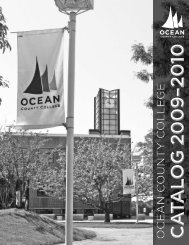current college catalog. - Ocean County College
current college catalog. - Ocean County College
current college catalog. - Ocean County College
You also want an ePaper? Increase the reach of your titles
YUMPU automatically turns print PDFs into web optimized ePapers that Google loves.
physics<br />
PHYSICS<br />
PHYS 171<br />
Physics I 4 cr. (3+2)<br />
A laboratory course dealing with the<br />
major areas of physics. These include<br />
measurement, mechanics, heat and sound.<br />
The basic principles of these topics are<br />
studied in terms of their applications. High<br />
school physics not required. Corequisite:<br />
MATH 161 or higher. Code 5 course fee.<br />
PHYS 172<br />
Physics II 4 cr. (3+2)<br />
Continuation of PHYS 171. This includes a<br />
study of electricity and magnetism, sound,<br />
light and modern physics. Prerequisite(s):<br />
PHYS 171. Code 5 course fee.<br />
PHYS 180 Introduction<br />
to Astronomy 4 cr. (3+2)<br />
A one-semester course concerned with the<br />
investigative tools of the astronomer and<br />
the implications of modern astronomical<br />
findings. The course begins by examining<br />
the nature of the scientific method and by<br />
applying that method to a number of key<br />
problems from the history of astronomy.<br />
It then proceeds to cover the most recent<br />
findings as to the nature, origin, and<br />
evolution of the planets, stars, galaxies, and<br />
the Universe itself. Laboratory work includes<br />
observations with the unaided eye and the<br />
telescope, and analysis of more complex<br />
observations. This course may not be used<br />
to complete the following sequence: PHYS<br />
181 Astronomy I: The Solar System and PHYS<br />
182 Astronomy II: Stars and Galaxies. High<br />
School algebra or MATH 011 recommended.<br />
Code 2 course fee.<br />
PHYS 181 Astronomy I - The<br />
Solar System 4 cr. (3+2)<br />
The nature of the solar system: the<br />
Sun, planets, moons, and other bodies<br />
orbiting the Sun. The tools and methods<br />
of astronomy. The nature of the scientific<br />
methods as applied to a number of key<br />
problems from the history of astronomy. The<br />
motions of the sky. Recent findings as to the<br />
nature, orgin, and evolution of the planets.<br />
Laboratory work includes observations<br />
with the unaided eye and analysis of more<br />
complex observations. Prerequisite: High<br />
School algebra. Code 3 course fee.<br />
PHYS 182 Astronomy II - Stars<br />
& Galaxies 4 cr. (3+2)<br />
This course builds upon the concepts<br />
presented in PHYS 181. Covers the most<br />
recent findings as to the nature, origin, and<br />
evolution of the stars, galaxies, and the<br />
Universe itself. Distances and motions of<br />
the stars. Life cycles of stars. Latest findings<br />
about the cosmos. Laboratory work includes<br />
observatons with the unaided eye and the<br />
telescope, and analysis of more complex<br />
observations. Prerequisite(s): PHYS 181.<br />
Code 3 course fee.<br />
PHYS 281<br />
General Physics I 4 cr. (3+2)<br />
Deals with composition of vectors, linear<br />
motion, kinematics, Newton’s laws, work<br />
and energy, momentum, rotational motion,<br />
gravitation, simple harmonic motion, waves,<br />
and fluids. This course is recommended for<br />
students planning to transfer to four-year<br />
institutions as engineering, physical science,<br />
pre-med, and computer science majors.<br />
Four years of high school mathematics and<br />
one year of high school physics are highly<br />
recommended for students enrolling in this<br />
course. Corequisite: MATH 265 or higher.<br />
Code 5 course fee.<br />
PHYS 282 General<br />
Physics II 4 cr. (3+2)<br />
A continuation of PHYS 281 dealing with<br />
thermodynamics, electric fields, electric<br />
potential, capacitance, AC and DC circuits,<br />
magnetic fields, induction, electromagnetic<br />
waves and Maxwell’s Equations, geometric<br />
optics, and interference and diffraction. This<br />
course is required for all students planning<br />
to transfer to four-year institutions as<br />
engineering, physical science, pre-med, and<br />
computer science majors. Prerequisite(s):<br />
PHYS 281 and MATH 265. Code 5 course fee.<br />
PHYS 283 General<br />
Physics III 4 cr. (3+2)<br />
A continuation of calculus-based PHYS 281/<br />
PHYS 282 (General Physics I and II) dealing<br />
with modern physics. Topics covered<br />
include relativity, quantum mechanics,<br />
and atomic, nuclear, and particle physics.<br />
This course is highly recommended for all<br />
students planning to transfer to four-year<br />
institutions as engineering or physical<br />
science majors and is also recommended<br />
for pre-med and computer science majors.<br />
Prerequisite(s): PHYS 282 and MATH 266.<br />
Co-requisite: MATH 267. Corequisite: MATH<br />
267. Code 5 course fee.<br />
political science<br />
POLI 161 American<br />
Federal Government 3 cr.<br />
A survey of the origins and development<br />
of our national government and political<br />
system in theory and practice.<br />
POLI 162 American State<br />
& Local Government 3 cr.<br />
A study of the common features of state and<br />
local governments in the United States under<br />
existing and ideal conditions. Some attention<br />
is given to New Jersey and local areas.<br />
POLI 183 Introduction to<br />
Political Science<br />
3 cr.<br />
A survey of the foundations of political<br />
theory and its relationship to government,<br />
political parties and pressure groups and<br />
modern political thought.<br />
political science • psychology<br />
POLI 185 Principles of<br />
Public Administration 3 cr.<br />
A survey of the principle philosophic and<br />
operational factors of public administration<br />
with emphasis on the major concepts<br />
involved in the science and art of<br />
government. The course considers such<br />
topics as organizational theory and practice,<br />
decision making, executive leadership and<br />
the political aspects of administration.<br />
POLI 263 Introduction to<br />
International Relations 3 cr.<br />
Students will examine the international<br />
political system, analyze the causes of<br />
war and the various approaches to world<br />
peace through a study of balance of power<br />
theories, disarmament, diplomacy, and<br />
international organizations. Also, students<br />
will examine economic forms of power and<br />
the increasing importance of international<br />
political economy.<br />
POLI 268 Women<br />
& American Politics 3 cr.<br />
The course examines the role of women in<br />
American politics in relation to: (1) gender<br />
and the history of American politics, (2) the<br />
emergence of women as political players as<br />
voters, candidates and officeholders and (3)<br />
public policies that directly affect women.<br />
psychology<br />
PSYC 171 Child Rearing 3 cr.<br />
This is a course about living with children<br />
in the day-to-day world. It will help you<br />
communicate more effectively with your<br />
children and learn to present discipline in<br />
a context of love and support. Creating an<br />
atmosphere of cooperation is therapeutic<br />
for the whole family. Issues involving<br />
divorce, single parenting and blended<br />
families will be explored, as well as some<br />
typical problems in infancy, toddlerhood,<br />
preschool, school years and adolescence.<br />
PSYC 172<br />
General Psychology 3 cr.<br />
A study of the behavior of the individual<br />
in terms of maturation, learning, emotion,<br />
motivation, perception, thinking and<br />
individual differences; basic to all other<br />
courses in psychology.<br />
PSYC 173<br />
Child Psychology 3 cr.<br />
The emphasis of the course will be<br />
the intellectual, emotional, social and<br />
physiological development of the human<br />
being. Child development will be followed<br />
from the preconception period through<br />
young adulthood. Research methods will<br />
be stressed and reading from anthropology,<br />
psychology, genetics, sociology and<br />
physiology will be required. Prerequisite(s):<br />
PSYC 172.<br />
732-255-0400 • www.ocean.edu Course Descriptions<br />
91



